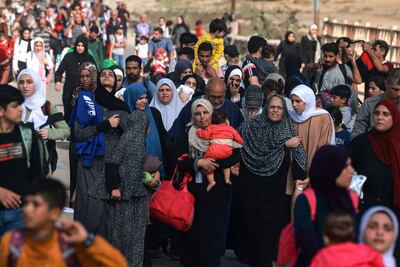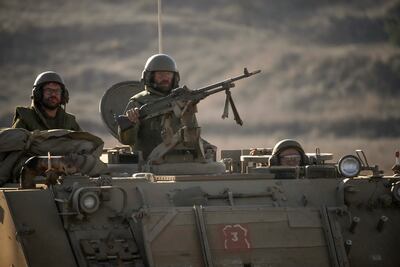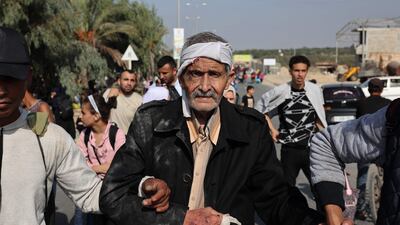Live updates: Follow the latest news on Israel-Gaza
Five hours walking in the hot sun with two toddlers in tow, amid the sounds of battle, past shouting Israeli soldiers and with dwindling water supplies.
This was endured by The National’s Nagham Mohanna in Gaza as she joined tens of thousands of Gazans fleeing south to purportedly safer areas, based on Israeli instructions to flee Gaza city, where Israelis are closing in on Hamas.
But, Mohanna reported, “there is nowhere safe.” Even with attempts to pause fighting for several hours a day – Israel insists the pauses are not “ceasefires,” – she said food and clean water are scarce.
“Why are they saying it's a safe area and they keep closing the border and preventing aid from coming through and people from moving? There's no safety if you can't drink water. Even when there is no shelling there's a shortage of water. You can't wash, you can't clean, it’s terrible. Without water, disease is spreading.”

The UN said 1.5 million people in Gaza, most of the enclave's 2.3 million population, are displaced and warned last week of a spike in waterborne disease as water supplies collapse.
Hundreds of thousands are crammed into relatives' homes, many to a room, or are sheltering in packed, UN-run schools, or hospitals, in the hope that those sites will not be bombed.
That has happened on several occasions however, and hundreds have been killed in air strikes in and around these targets, which Israel said Hamas have also been using.
The air strikes have drawn a mounting chorus of international condemnation, including among close Israel allies France and the US.
Amid all this, water supplies have collapsed.
Mohanna said she has seen people buying water pumped from wells. “But I don’t think this is drinkable water,” she said.
“Some people have some bottles with them. But after that if you reach one of the supposedly safe areas, people who are extremely thirsty from the hot weather are desperate. The water to buy, it’s expensive and not for drinking.”
Gazans are also going hungry as aid entering the enclave is a tiny fraction of what is needed. The Israeli blockade and inspections of aid lorries means that nearly 800 vehicles have entered through the Rafah crossing on the Egyptian border since October 21.
That is about 40 a day. The UN said under “normal” circumstances, which involve strict controls on what enters Gaza, up to 500 lorries a day would pass through.
The long road south
“It took us from about 10am to 3pm to walk south, there were Israeli tanks and armoured vehicles on the route,” Mohanna said.
She said the journey took far longer than normal, even in the arduous situation of being forced to walk due to damaged roads because the Israelis “stopped us, and then we were moved on,” on several occasions.

“Sometimes they were asking for someone to come to them to investigate them. So they're stopping people and questioning people, and watching people as we walked.”
She said the soldiers were difficult to see however – and it was difficult to assess their temperament. But the crowds with her were instructed by shouting soldiers to keep looking ahead and keep moving.
“We can’t look back because you are not allowed to just look anywhere you have to look in front of you. And sometimes they ask someone to just present their ID to see what their name is. And then they let them go,” she said.
The Israeli military has detained a number of people among those moving south.
“If you drop something, you can’t stop to pick it up, you have to just go, they keep saying ‘walk you have to walk.’”
But there is nonetheless a spirit of resilience among her fellow Gazans, Mohanna said.
One issue adding to the trauma, along with regular cuts of internet and phone services, is the lack of electricity for charging phones. Some Gazans are trying their best to help others get access to calls, in the brief windows when communication works.
“Some people who have a rooftop solar system can help others by charging their phone,” she said.
“But something that needs a lot of power, it’s a different story. There is no electricity and there is no power for generators so electricity and fuel for generators is limited to the most critical infrastructure, such as hospitals and where flour is available, bakeries.”
“But because there is no electricity, and with that problem, no water also, because they need electricity to pump water.
“Right now, the situation in the south is that there is not enough water or food for the population,” she said, warning that international aid getting through to the strip is severely inadequate.

